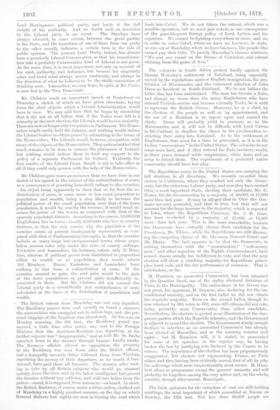Mr. Childers gave more prominence than we have done in
our sketch of his speech to the subject of the redistribution of seats, as a consequence of granting household suffago to the counties, —his object being apparently to show that so far from the re- distribution of seats, in some more or less exact proportion to population and wealth, being a step likely to increase the political power of the rural population over that of the town population, it would be exactly the reverse ; it would much in- crease the power of the towns, as compared with that of the sparsely populated districts. According to the census, 16,000,000 Englishmen live in towns, to only 8,000,000 who live in country districts, so that the only reason why the population of the counties seems at present inadequately represented, as com- pared with that of Parliamentary boroughs, is, that the counties include so many large but unrepresented towns whose popu- lation possess votes only under the rules of county suffrage. Yorkshire and Lancashire, for instance, return only 55 Mem- bers, whereas, if political power were distributed in proportion either to wealth or to population, they would return 100 Members. Hence, Yorkshire and Lancashire have nothing to fear from a redistribution of seats. If the counties seemed to gain, the real gain would be the gain of the town populations at present quite insufficiently re- presented in them. But Mr. Childers did not commit the Liberal party to a scientifically just redistribution of seats calculated on the basis of the distribution of population and wealth.


































 Previous page
Previous page